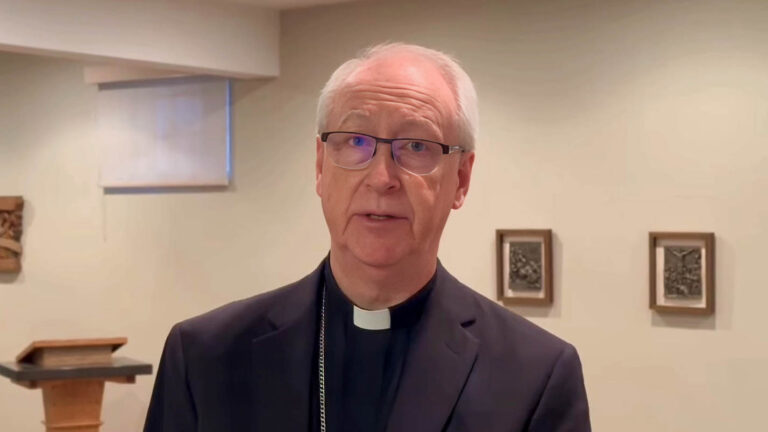Fourth Sunday of Lent – Year B
Homily
[2Chronicles 36: 14-16, 19-23; Psalm 137; Ephesians 2:4-10; John 3:14-21]
This past week I flew to Toronto for some meetings. Now, I find lately that, whenever I head to an airport, I do so with considerable trepidation. Will the plane be on time? Will there even be a plane? Will the luggage arrive, and, if it is lost, will I ever find it again? Such questions arise in the minds of many people these days because of experiences with system failure, whether that be mechanical malfunction, scheduling glitches, or computer crashes. It all combines to create an abiding lack of confidence and breakdown of trust on the part of air travellers.
In order to ponder what God is saying to us in His Holy Word at this mass, I invite you to consider how the breakdown of confidence in the reliability of air travel is but one example of a general collapse of trust in our society right now. This arises from a host of “system failures” that are giving birth to trepidation and anxiety everywhere. For example, global instability leads us to question the reliability of political leadership; the idea of fake news and practice of spin doctoring cause us to doubt the veracity of what is reported in multiple news platforms; even within the Church, the sins and errors of ecclesial leaders, or their, at times, contradictory messaging leave many people wondering who or what to believe. Most worrisome of all, family “system failure” can cause a trust deficit in the home, and many young people are left feeling very unsettled.
From all of this arises the question: can I even trust God? We hear this question posed quite often in response to the painful reality of suffering. How can God, who is supposed to be all-loving, allow all of the terrible misery that flashes hourly across our television screens and smartphones? Such global “system failure” leaves many wondering if even God can be trusted. This is the very question addressed by the biblical texts for this mass. The answer given is this: God is fully trustworthy; system failure arises when we place our trust not in him but ourselves. Let’s explore this.
First of all, with respect to whether God can be trusted, we hear Jesus himself assure us that God is entirely trustworthy when he says: “For God so loved the world that he gave his only-begotten Son.” There can be no greater proof of the reliability and trustworthiness of God than His unbounded love for us, so great as even to give His own Son. He invites us to trust this love, to hold onto it absolutely, when he goes on to say that God gave His only Son, “so that everyone who believes in him may not perish but may have eternal life.” Faith is a decision, a deliberate choice to place our entire trust in this great love. Jesus, by not only his words but also his own willingness to die for us, gives us today the assurance that there is never a “system failure” in God; He is steadfast in His love for us, always faithful to His every promise, absolutely reliable.
What, then, of the widespread “system failure” plaguing our world? Let’s keep in mind that the human being is created by God to live with Him in a relationship of trust and love, walking always in accord with His commandments. Living in accordance with God’s loving intention creates a “system” of good and just relationships not only with God but also other people. “System failure”, then, arises from the choice not to trust God and act instead in accord with our own thinking, a decision we call sin. This inevitably gives rise to “crashes” that leave great pain and hardship in their wake.
An example of this is given in the first reading. It recalls the captivity of the ancient Jewish people in a foreign land, the destruction that had befallen them because of their “system failure”, their collective decision to trust in themselves rather than God. When they came to realize that their self-reliance was the cause of their sorry plight, they cried out to the Lord for help. The passage goes on to recount how God then acted to “fix the system”. Never failing in His love and always ready to forgive, God heard their cries. He inspired their foreign ruler, Cyrus, to release them from bondage and restore them to their homeland, the place they belonged.
Likewise, God is always ready to fix the “system failures” we bring upon ourselves through sin. St. Paul reminds us that “God is rich in mercy”. If we acknowledge our sins and call upon God to return our system to its proper functioning, God will hear our pleas and respond. By the gift of His mercy, we are returned to His loving embrace, which is our true “homeland”, the place we belong. After all, as Jesus himself says, God sent His Son not to condemn but save us, to lead us out of bondage to sin and restore us to Himself.
This is precisely what Jesus did when he gave his life on the Cross and rose again. The very same self-offering of the Lord is rendered present among us, here and now, in the wondrous sacrament of the Eucharist. Let us pray, then, that the grace of communion with our Lord will heal our many “system failures” by renewing us in faith and restoring our complete trust in the never-failing love of God.
Most Reverend Richard W. Smith
Saint John Bosco Parish
March 10th, 2024


